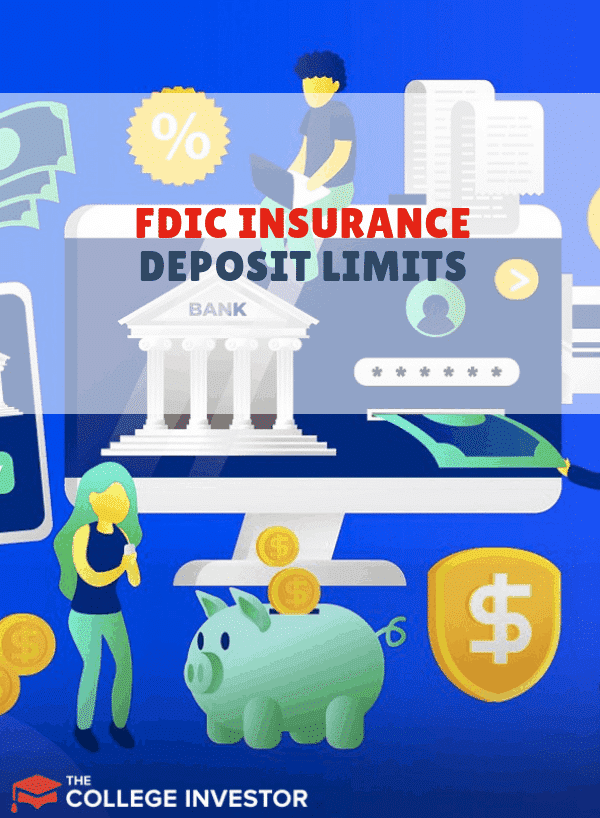
With recent bank failures, many wonder how they can insure excess bank deposits beyond the FDIC insurance limits.
Have you ever wondered what would happen to your money if your bank suddenly went belly up?
While bank failures were relatively uncommon before the 2008 financial crisis, a large number of them shut their doors in the years following according to the FDIC. And in the last two years, we've seen some of the largest bank failures in US history.
Thankfully, even if your banks shuts down your money is protected up to to a limit by the federal government. But what happens when you have funds deposited at a bank that exceeds the FDIC limits?
Learn how to insure excess bank deposits in this guide.
What Are FDIC Limits?
FDIC stands for Federal Deposit Insurance Corporation (fdic.gov). The FDIC is an independent agency of the federal government. Banks participate in the FDIC insurance program.
Deposits at FDIC-insured banks have coverage up to $250,000 per depositor, per bank. This means that up to $250,000 of your money, spread across deposit accounts, is covered at a single bank. Deposit accounts include:
If you and another person have equal ownership of a joint account, you are each insured up to the same $250,000. That’s a total of $500,000 of FDIC insurance on a joint account.
You can calculate coverage for your specific group of deposits using the FDIC’s Electronic Deposit Insurance Estimator (EDIE). To find an FDIC insured bank, use the FDIC’s search tool. FDIC insurance does not cost anything and there are no forms to fill out.
What Happens If An FDIC-Insured Bank Fails?
In an FDIC-insured bank was to go out of business, the failed bank’s deposits would be transferred to another FDIC-insured bank. If that isn't possible, depositors will receive a check from the FDIC up to the amount of coverage for their deposits (up to the maximum of $250,000 per person).
This raises the question: What happens if you have more than $250,000 in checking and savings accounts? Let’s say you have $200,000 in each account type. $150,000 of the $400,000 is not FDIC insured.
Certainly, you can deposit as much money at a single bank as you want but once you go past $250,000, you lose FDIC insurance. The next section goes over a few ways to insure excess bank deposits beyond the $250,000 limitation.
How To Insure Excess Bank Deposits Above The FDIC Limits
There are a few ways to insure excess bank deposits that exceed the $250,000 limit. Here are three options worth considering.
1. Split Your Funds Across Multiple Banks
Remember, FDIC coverage is per depositor, per bank. So you can get two, three, or four times the FDIC coverage by simply opening multiple accounts.
For example, if you have $300,000 in bank deposits, you could open two bank accounts, putting $150,000 in each. Or if you have $400,000 in deposits, you could put $200,000 in each bank. Here are the best online bank accounts for your money.
You can also open multiple savings accounts at different banks as well, including business savings accounts. Here's our list of the best business savings accounts right now.
Going this route can be time-consuming both in getting started and maintaining everything. You’ll also receive statements from each bank in which you have funds deposits. Additionally, multiple bank logins will be required.
Side Note: Some places will now do this for you automatically. For personal banking, Wealthfront now advertises $8m in FDIC insurance coverage for individuals, and $16m for families. They do this by spreading the money across partner banks.
On the business banking side, Mercury does similar - offering $5m in FDIC insurance coverage through partner banks.
2. Use the Certificate of Deposit Account Registry Service (CDARS)
There is a simpler method for spreading funds across banks. It’s called CDARS or Certificate of Deposit Account Registry Service®. CDARS is a network that splits CD deposits across multiple FDIC-insured banks.
With CDARS, you’ll receive one statement instead of multiple. It makes the whole task of depositing more than $250,000 and keeping FDIC insurance much easier.
CDARS is limited to CDs. While CDARS doesn’t charge a fee, the CD rate you receive will be a little less than the equivalent market rate. These are the banks offering the highest CD rates. However, for the convenience that CDARS provides, it may well be worth it.
3. Find Banks That Insure Excess Bank Deposits With DIF Insurance
DIF stands for Depositors Insurance Fund (https://www.difxs.com). It has been around since 1934 and is similar to FDIC insurance. But while FDIC insurance is limited to $250,000, DIF covers any deposits above the FDIC limit.
DIF is only available at FDIC-insured banks. It is a private fund and like FDIC insurance, DIF doesn't cost anything. There are no forms to fill out either. The DIF fund has approximately $500 million in assets. On DIF’s website, it states, “no depositor has ever lost a penny in a bank insured by both the FDIC and the DIF.”
BankProv is one example of a bank that's able to insure excess bank deposits by combining FDIC and DIF insurance. In addition to offering 100% insurance, their saving accounts come with no monthly maintenance fees and offer a competitive yield. Check out BankProv.
Final Thoughts
Most people will never hit the FDIC deposit limit. Some aren’t even aware there is such a limit. But now you know exactly how to insure excess bank deposits above the $250,000 limit should the need arise.
Going with an FDIC and DIF insured bank like BankProv is your simplest option to insure excess cash. But opening multiple bank accounts or using the CDARS service can work too if you're willing to do some extra legwork.

Robert Farrington is America’s Millennial Money Expert® and America’s Student Loan Debt Expert™, and the founder of The College Investor, a personal finance site dedicated to helping millennials escape student loan debt to start investing and building wealth for the future. You can learn more about him on the About Page or on his personal site RobertFarrington.com.
He regularly writes about investing, student loan debt, and general personal finance topics geared toward anyone wanting to earn more, get out of debt, and start building wealth for the future.
He has been quoted in major publications, including the New York Times, Wall Street Journal, Washington Post, ABC, NBC, Today, and more. He is also a regular contributor to Forbes.
Editor: Clint Proctor Reviewed by: Ashley Barnett
